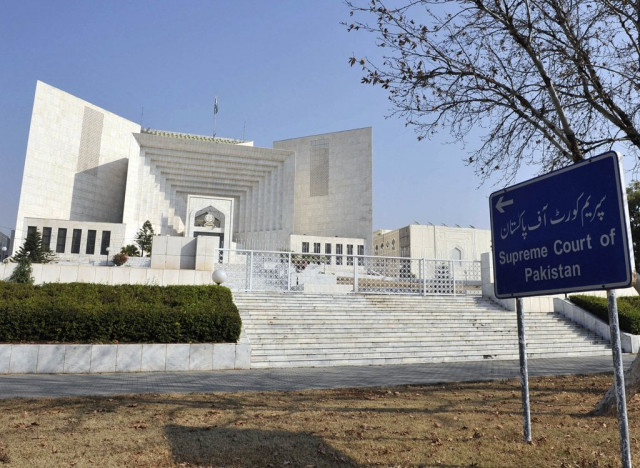Top court explains family laws Section 4
Rules great-grandchildren have no share in ‘propositus’ property

Islamabad. The Supreme Court has ruled that great grandchildren did not have any share in the property left behind by ‘propositus’ on the basis of Section 4 of the Muslim Family Laws Ordinance, 1961.
Section 4 reads: that in the event of the death of any son or daughter of the propositus before the opening of succession, the children of such son or daughter, if any, living at the time the succession opens, shall per stirpes receive a share equivalent to the share which such son or daughter, as the case may be, would have received if alive”
A three-judge bench of the apex court led by Chief Justice of Pakistan Umar Ata Bandial has adjudicated the question of law as whether great grandchildren come within the meaning of “children” for the purposes of Section 4 of the Muslim Family Laws Ordinance, 1961.
In 2000, the court noted that the Federal Shariat Court (FSC) declared that the section is contrary to the Injunctions of Islam. However, the judgment is under appeal before the Shariat Appellate Bench of the apex court.
Read more: Supreme Court gives sisters rightful share in inheritance
The proviso to Clause (2) of Article 203(D) provides that if an appeal has been preferred to the Shariat Appellate Bench, then the decision of the FSC shall be deemed stayed pending disposal of the appeal.
“The position that emerges, therefore, is that for the purposes of deciding this matter, Section 4 of the ordinance is to be regarded as being in the field, but the provision must be interpreted and applied on its own footing, purely as a matter of statutory interpretation,” says the five-page judgment authored by Justice Munib Akhtar.
Justice Akhtar said that it is a fundamental principle of the law of Muslim inheritance that legal heirs of a person are only determined at the moment of death and not before.
“This rule is clearly reflected in Section 4 by the use of the words “opening of succession”. The point is then reinforced by the immediately succeeding words, “the children of [the predeceased] son or daughter, if any, living at the time the succession opens” (emphasis supplied)”.
“The words emphasise/impose a clear limitation: Section 4 applied only to those grandchildren as are alive at the time of the death of the propositus”
The court said that it is of course well known that under the rules of Muslim inheritance, the legal heirs of a predeceased son or daughter do not inherit from the parent of the predeceased.
“Section 4 carves out a carefully-constructed exception from this rule. It is not without significance that the section does not refer to the legal heirs of the predeceased son or daughter: the words used are “the children of such son or daughter” and not ‘legal heirs’.
Read More: ‘Women inheritance rights protected under law’
“Quite obviously for the predeceased son or daughter to have children they would have to have had a spouse, who could also be alive when the parent passes away. Yet, any spouse is excluded from the applicability of Section 4.”
“It is also to be kept in mind that some of the rules of Muslim inheritance can apply across generations, which is encapsulated in the phrases “how high so ever” and “how low so ever” used in the standard treatises.
“Any possibility of Section 4 having such an effect (which, in essence, is the case pleaded by the leave petitioners) is carefully excluded by use of the words emphasized above, i.e., “living at the time the succession opens”. Read as a whole, the purpose and intent behind Section 4 is clear.
“The exception created by it is limited and circumscribed. It applies only to those grandchildren as are living at the time of the death of the propositus. An extended meaning cannot be given to the section in terms as urged by learned counsel for the leave petitioners. They being the great grandchildren did not have any share in the property left behind by the propositus on the basis of s. 4. Both the learned trial court and the learned High Court were therefore correct in dismissing their claim”, says the order.
Facts of case
One Mrs Tameez un Nisa (‘propositus’) was the owner of a residential house in Islamabad (“property”). She died on 19.06.2015. She had several children of whom two sons predeceased her. One of those sons was Nawab ud Din, who passed away on 09.04.1992. One of the children of Nawab ud Din was Aziz ur Rehman, and the present leave petitioners are his children. Thus, Aziz ur Rehman was the grandson of the propositus and the leave petitioners are her great grandchildren. Now, Aziz ur Rehman himself passed away on 07.12.2005, i.e., before the propositus. The leave petitioners claim a share (proportionately) in the property on the basis of s. 4 of the Ordinance. They filed suit in the civil courts of Islamabad on such basis, which was dismissed. The appeal preferred to the learned High Court met with the same fate in terms of the impugned judgment. It was held that s. 4 did not apply to great grandchildren. The apex court dismissing the petition also upheld the high court judgment.
The Supreme Court order said that had these words been absent then, perhaps, a case could be made out for the interpretation put forward by learned counsel for the leave petitioners. However, the words do exist and therefore must be given due effect.
“To accept the case sought to be made out would, in effect, erase them from the statute. That would be contrary to well established rules of interpretation.”



















COMMENTS
Comments are moderated and generally will be posted if they are on-topic and not abusive.
For more information, please see our Comments FAQ